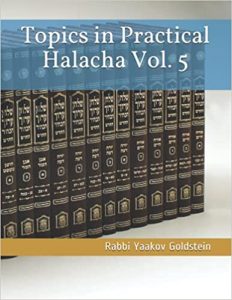*As an Amazon Associate I earn from qualifying purchases.
Paying a worker/employee on time:[1]
One is [Biblically] required to pay a worker on time. If one delays payment of a worker he transgresses a Biblical negative command [and according to some Poskim[2] he also transgresses a Biblical positive command].
The prohibitions to delay payment: The verse[3] states “Beyomo Titen Secharo Velo Savo Alav Shemesh.” [From the words Beyomo Titen Secharo some Poskim[4] learn it is a positive command to pay a worker on time.] From the words “Velo Savo..” we learn that one who does not pay on time transgresses a negative command.[5] More particularly: If the worker finished working by day, and was not paid by the end of the day, the employer transgresses the above [positive and negative command[6]].[7] If the worker finished working by night, and was not paid by the end of the night, prior to morning, the employer transgresses the negative command of “Lo Salin Peulas Sachir Itcha Ad Boker[8]”.[9]
One who does not plan to pay at all:[10] An employer who refuses to pay an employee/worker is considered as if he took his soul.[11] The employer transgresses five negative commands and a positive command.[12] [These commands are 1) Lo Sigzol; 2) Lo Sashok Sechar Sachir; 3) Lo Sashok Es Reiacha; 4) Lo Salin; 5) Lo Savo Alav Hashemesh; 6) Biyomo Titen Secharo.[13] The above 5/6 transgressions apply only if one refuses to pay at all. If however he refuses to pay on time and plans to pay later on then he does not transgress 5/6 commands, and rather only transgresses the commands stated above.[14]]
_____________________________________________________[1] Admur Sechirus 11; Michaber C.M. 339/1; Rambam Sechirus 11/1; Bava Metzia 111a
[2] Smeh 339/4; Beis Yosef 339; Rambam ibid and in Sefer Hamitzvos Mitzvah 200
Other opinions and ruling of Admur ibid: The Chinuch in Parshas Ki Savo does not list this Mitzvah as a positive command. Furthermore, in Mitzvah 230 he states that we do not list “Beyomo Titen” as a separate command as its inclusive within the first command of Lo Salin. Regarding the opinion of Admur ibid: The mention of this being a positive command is completely omitted from Admur, seemingly implying that it is only a negative command.
[3] Devarim 24/26
[4] Smeh 339/4; Beis Yosef 339; Rambam ibid and in Sefer Hamitzvos Mitzvah 200; See other opinions and opinion of Admur stated above
[5] Admur ibid; Smeh 339/1 and 4
[6] Smeh 339/6
[7] Admur Sechirus 12; Michaber 339/3 states he transgresses the [positive] command of “Ubeyomo”; Smeh 339/6 explains that Michaber intends to say that he transgresses both the positive and negative command. As stated above, Admur ibid omits any mention of transgressing a positive command.
Other opinions: The Chinuch in Mitzvah 230 states that we do not list “Beyomo Titen” as a separate command as its inclusive within the first command of Lo Salin.
[8] Vayikra 19/3; Chinuch Mitzvah 230
[9] Admur Sechirus 12; Michaber 339/3
When delaying payment at night does the employer transgress the positive command? Some Poskim learn that one transgresses the positive command of Biyomo Titen Secharo anytime one delays payment, whether by day or night, and only regarding the negative command is there a difference between the negative commands. [Beis Yosef 339 “Biyomo means on time, whether day or night”] However its implied from the wording of Admur/Michaber ibid that when the work was finished at night, there is no positive command transgressed by delaying payment. See Minchas Chinuch Mitzvah 230; Vetzrauch Iyun!
Other opinions: Some Poskim learn that one transgresses both negative commands of night and day anytime he delays payment, whether by day or night. [Beis Yosef 339, in name of Maggid Mishneh, in explanation of Rambam ibid; Maggid Mishneh and Lechem Mishneh on Rambam ibid; brought in Smeh 339/4] However, from the simple understanding of the Gemara ibid they do not transgress each other’s prohibitions. [Minchas Chinuch ibid]
[10] Michaber 339/2
[11] Michaber ibid; Bava Metzia 112b
[12] Michaber ibid; Tur 339; Bava Metzia 111a; Rambam ibid only lists 4 negative commands
[13] Smeh 339/4; Bava Metzia ibid
[14] Smeh 339/1; Beis Yosef 339; See Minchas Chinuch 230


 Donate
Donate
Leave A Comment?
You must be logged in to post a comment.